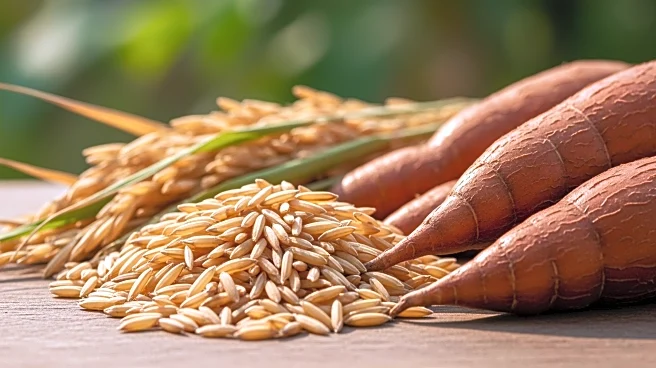What's Happening?
The Niger government, in collaboration with the International Fund for Agricultural Development (IFAD), has reported significant progress in enhancing the rice and cassava value chains within the state.
Hadizat Isah, the coordinator of the Niger State Programme Management Unit, presented these achievements during a Steering Committee meeting in Minna. Despite facing operational challenges, the Value Chain Development Programme Additional Financing (VCDP + AF) has successfully supported smallholder farmers, improved market access, and expanded agribusiness opportunities. The program has also made strides in farmer capacity-building, climate-smart input provision, rural infrastructure rehabilitation, and public-private partnerships. Thousands of beneficiaries have been empowered through training, enterprise development, and the adoption of improved technologies, leading to increased productivity and incomes.
Why It's Important?
The achievements in the rice and cassava value chains are crucial for boosting agricultural productivity and improving rural livelihoods in Niger State. By empowering smallholder farmers and enhancing market access, the program contributes to economic growth and food security. The collaboration between the Niger government, IFAD, and other stakeholders underscores the importance of sustained partnerships in achieving agricultural development goals. The program's success also highlights the potential for similar initiatives to be replicated in other regions, promoting sustainable agricultural practices and rural development across Nigeria.
What's Next?
The Niger government, along with IFAD and other stakeholders, plans to continue supporting the program to consolidate the gains achieved. The Steering Committee, chaired by Matthew Ahmed, permanent secretary of the Niger Ministry of Agriculture, will provide strategic direction to ensure the program meets its targets. The state government is committed to strengthening policies and creating an enabling environment for agricultural development. Continued collaboration among stakeholders is essential to maintain progress and address any challenges that may arise.
Beyond the Headlines
The program's focus on climate-smart inputs and improved technologies reflects a broader trend towards sustainable agriculture. By prioritizing environmental considerations, the initiative not only enhances productivity but also contributes to long-term ecological resilience. The empowerment of smallholder farmers through training and enterprise development is a critical step in reducing poverty and promoting economic independence in rural communities.










